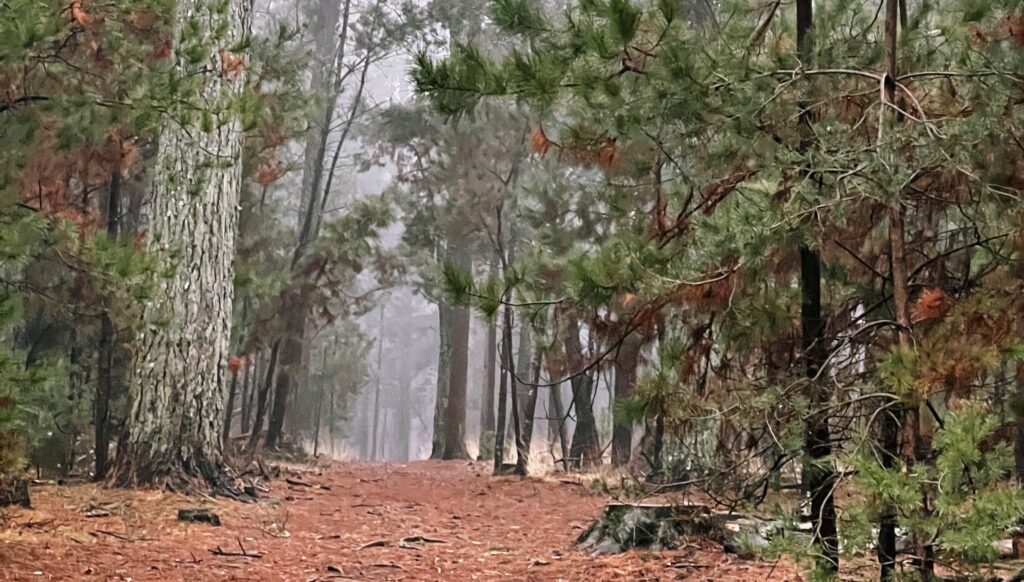During an intermission in the lockdowns last year, for want of better entertainment, my wife and I moved house, swapping the seaside town we had long inhabited for a quieter place inland. Our new abode is a small bungalow in Verwood.
A three-bedroom affair in a street where you could almost hear a leaf fall, it came with a moaning chimney and four fresh ghosts—two human, two feline. The felines, one by the name of Monty, the other of unknown epithet, are interred in our back garden and have behaved well so far. I am not sure I can say the same of the humans, though. Floating by our freshly painted ceiling, I am certain they are laughing their heads off at our awkward attempts at home refurbishment, for there’s nothing the English love more than poking fun at the DIY of others. (Where I come from, we outsource such work to pros, then rant and rave and try to underpay—but that, alas, is not an option here.)
Our bungalow backs the Ringwood Forest, a long stretch of heathland swathed in woods and crisscrossed by miles of biking trails. There are no tigers or elephants here, sadly. But you could startle a deer before breakfast. Or a woodlark. We lost an ocean on our doorstep when we moved, but we gained a forest—only in name, but a forest nonetheless—as back garden.

If I cut across ‘my’ back garden and walk 1.5 miles west through conifers, over a hill, and past some sandpits, I get to Verwood. Technically it is a town, complete with a Costa and a mayor, but no one seems to have let that fact slip to the townsfolk yet. So everyone—except the slick estate agents on coffee-breaks between their wetwork—wander about the Village Green in a sleepy-eyed, time’s-on-my-side kind of way. It is refreshing.
One reason for this old-world calm is but the obvious. Verwood IS old. It has been around since 1288, originally as Beau Bois, French for fair—as in, beautiful—woods. How the French inflection came to the settlement is a question I cannot answer at this point, but I do know that by 1329, it had gone native and was being referred to as Fairwood. When 1887 came around, the place was well-established as a potting village, and was being referred to as Verwood, owing to a peculiarity of the Dorset dialect, which contrives Vs out of Fs (or something along those lines). At this point in time, the village had four brick-makers, six earthenware dealers, and six potters, besides one horse dealer, one gardener, one bookmaker, one threshing machine hirer; two bakers, two grocers, two carpenters, two coal merchants, two wheelwrights; and three blacksmiths, and three cow-keepers. It also had two pubs. All this I know because I spent a delightful couple of hours at the local library last week, leafing through Images of England: Around Verwood, Verwood: Village To Town, and Verwood Village Days: A Glimpse Into The Past.
The other reason for Verwood’s look of lassitude is demographical. Twenty-seven per cent of the 15,196 townsfolk here are above 65, and a sizeable segment of the 16-64 category are more 64 than 16. So when I wander the town on weekdays, after the young and not-so-young have left for work to Bournemouth and Southampton and Ringwood and Ferndown, and the 2,650 of Verwood’s young and bright have been firmly placed under lock and key in various institutions, I could well have stepped into an open-air retirement home. Every second dog-walker I meet as I cut through the woods is a senior citizen, and the sturdy runners who jog past mostly look like better-barbered versions of Gandalf the Grey. The town square is quiet, populated by a handful of pensioners perambulating to or from the coffee shop in the Verwood Heathland Heritage Centre.
One morning, in the first month of our move, I poked my head inside the coffee shop and found myself the centre of what I would like to think of as unbridled admiration. Conversation lulled. Tables of friendly faces looked up astonished, subjecting me to sustained scrutiny before returning to tea, cakes, and more scrutiny. I have added curiosity value amongst the elderly, I suppose. In a town that is 96.3 per cent white British, I am sunburn, the shadow’d livery of the burnish’d sun, hitherto in evidence only at The Spice of India. How I basked!
Outside the coffee shop, past the Costa and a wealth manager, is the Nicholas O’Hara Funeral Home. Here you can subscribe to a nice burial for “just 34 pence a day”. They also sell “fingerprint jewellery and products”, ostensibly because business isn’t brisk (83 per cent of Verwoodians report very good or good health). Downstreet, the United Reformed Church displays a poster of TOMBBUSTERS, “starring Jesus Christ”, with the tagline “never underestimate the power of GOD”. Next to it is the popular library, then the butcher’s, then the post office.
The post office, like it is in many villages across the UK, is not just a post office. It is a way of life, an identity, a social hub. Before I moved to Verwood, I had only a vague idea about the row around post offices closing across the country and how that has spelt doom for many villages. But how much the establishment actually means to the villagers was brought home to me one morning when a cheerful lady in a mobility scooter waylaid me.”We are so lucky to have this, you know,” she said. “They are closing down post offices all over. I read about a village like ours where they were shutting it down. But two lads, teenagers they were, they did something about it. They trained as post clerks and reopened it. And they added a tea-shop to it! They are doing roaring business now, because for people like us, it is important.” Then, probably sensing my inexcusable impatience, she turned her scooter and said, “I may be an old crock, but I still have marbles around. Thanks for listening!” Shamefully I slunk away.
While the post office has endured, and residents appear not too short of a penny, the town itself has seen better days, in my opinion. It has gained a gym, and the aforementioned Costa, a Morrison, and, quite recently, a Lidl and an Aroma cafe, true. But lost are some of the icons of village life: the general haberdashery store (named The Verwood Bon Marche in its heydays), the sweet shop, and the local chemist (replaced by Lloyds Pharmacy). Barrow Bros, the family bakery and grocery store known for wonderfully flavoured bread (apparently, it was heated with hazel wood faggots, which doesn’t sound all that appetising), has been replaced by a private dwelling. Gone too is the Spar, and the video library, and the railway station, which, built in 1866, was an economic game-changer for the village once described as the “poorest place on earth”. The station, together with the Albion Hotel attached, became the hub of Verwood, the heart of its prosperity, “bringing businesses” and “broadening Verwood’s horizons and an influx of people from distant places”. It shut down in 1964, leaving behind the hotel—which is now Albion Inn—with a drawing of a steam engine on one wall and some picket fences.
All is not lost, though. Not yet. There is still a country market every so often in the Memorial Hall. Patronage of the town’s five toilets—and these are proper constructions with tiled walls and tidy mirrors, mind—is still free. And for now you can still park all you want in the main car park right in the square without paying a penny. How many towns can boast that?
I am not sure how long all this will last. But I am glad we moved to the small town with village vibes.

Previous Next